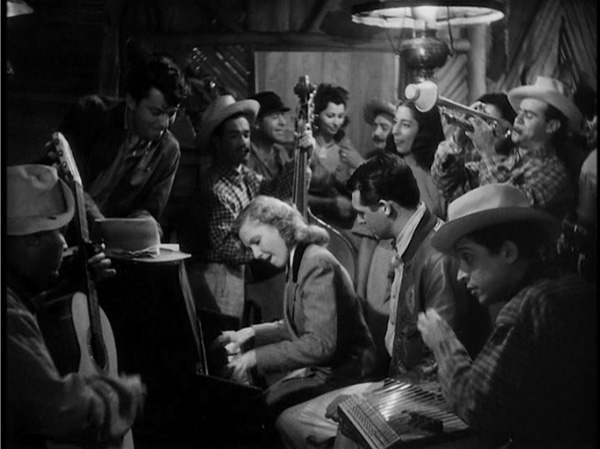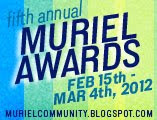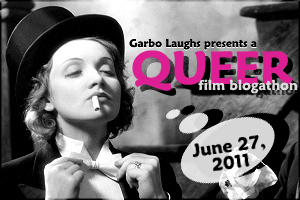The more I see it, the more I'm convinced that Only Angels Have Wings (1939) is the pivotal movie that turned Howard Hawks into an auteur in the theoretical sense and turned Cary Grant into a star for all occasions. Grant here is dramatically different than the Grant in, say, Bringing Up Baby. He's an action hero here, with no whinnying and no ridiculous situations. There's a brooding, intense edge underneath the facade of polished movie star that points the way to the darkness teased out of the Grant persona by Hawks a couple of years later in His Girl Friday. Nothing Grant had done prior to this movie gave any hint that he was anything more than a handsome light comedian. But it's Hawks who, perhaps, makes the more startling transformation. Hawks made some great films prior to this one, but here all the trends percolating through his earlier films come to the fore. This is the template for what we can now recognize as Hawks's directorial signatures. Principal among the auteurial markers is the compositions of groups in the frame and how they form communities. Not only that, but these compositions frame specific types of communities that recur in Hawks's movies time and again, communities centered around professionals doing their jobs. The Jean Arthur character in Only Angels Have Wings starts on the outside of one such community--a tight-knit group of pilots--and her ignorance of the mores of this group isolate her. Consider the following pieces of this shot:



 In this shot, Jean Arthur's character has gone to pieces after her new friend has died horribly in a plane crash. Her reaction is antithetical to the professional mores of all the pilots in the community and Hawks's screen composition slowly strips the community away from the un-professional Arthur, one character at a time. This is a stark contrast from the way her character is shot once she demonstrates her professional bona fides:
In this shot, Jean Arthur's character has gone to pieces after her new friend has died horribly in a plane crash. Her reaction is antithetical to the professional mores of all the pilots in the community and Hawks's screen composition slowly strips the community away from the un-professional Arthur, one character at a time. This is a stark contrast from the way her character is shot once she demonstrates her professional bona fides:

 In the first of these two captures, Jean Arthur is at the center of the composition, but is not yet at the center of the community. Note the eyelines of the characters throughout the frame. They point in a number of directions, but generally don't point at Jean Arthur. Shortly after, her character demonstrates her professional specialty, and in the second capture, she's both at the center of the composition AND the attention of the community. As if to sign off on her acceptance into the community, Cary Grant's character greets her at the end of the shot with the line, "Hello, professional."
In general, the accumulation of auteurial tics transforms Only Angels Have Wings from a collection of odd plot contrivances into a superb movie. Hawks is already using pulp-fiction plot construction where the scene outranks the plot. Hawks would later formulate the theory that a good movie consists of at least three good scenes and no bad ones. This movie fulfills this requirement and then some. The movie even points the way to Hawks's signature work in the forties when Jean Arthur's character tells Cary Grant, "I'm not hard to get. All you have to do is ask," a line repeated verbatim in To Have and Have Not, a film that bears no small amount of resemblance to this one.
Hawks's examination of the professional as center of the community reaches its apotheosis in His Girl Friday (1940), but in spite of its central place in the director's work, it's more of a collaboration than one might expect. The movie simply wouldn't work without Cary Grant and his ceaseless tinkering with the Grant persona. For Hawks's part, the movie puts Rosalind Russell at the center of the community as the consummate professional who wants to chuck it all. The problem is, her job is central to who she is. Although it puts the thought into the mouth of her rat bastard editor, Walter Burns, the movie has a knowing insinuation that she'll be miserable as a housewife in Albany with milquetoast Bruce Baldwin for a husband ("He looks like that fella from the movies. Y'know, Ralph Bellamy"). Burns knows and we know that she'll be diminished if she abandons her job. In addition to all of this, Hawks also throws in one of his occasional examinations of gender roles. This is more than turning Hildy Johnson into a "Hawksian" woman (as opposed to the character one finds in The Front Page) to add romantic interest--though there is surely some of that in the relationship between Johnson and Burns--it represents a minor auteurial liet motif that runs through some of Hawks's other pictures (notably I Was a Male War Bride). One could surmise that Hawks's point of view is that gender roles are ridiculous on the surface--certainly, Hildy Johnson as a wifey in the sticks is ridiculous--and that one's professional demeanor is more central to defining one's personality and place in the community.
For Grant's part, well...there's no dancing around it. The Front Page flat out doesn't work without Grant. Walter Burns is such a colossal prick that unless he has the charisma and charm of Grant, there is no way Hildy Johnson succumbs to his ruses. None of the other actors who have played him on film have lent him the almost demonic glee that Grant plays, and none of them put the audience on the side of the profession of journalism in the way His Girl Friday does. Grant is well nigh irresistible. This is an interesting test of the Cary Grant persona, too, because it demonstrates that regardless of how evil the character is, it is sublimated by his charm. This is no small element of the persona, because it allows grant to be credible in Suspicion, Notorious, and even Charade.
In the first of these two captures, Jean Arthur is at the center of the composition, but is not yet at the center of the community. Note the eyelines of the characters throughout the frame. They point in a number of directions, but generally don't point at Jean Arthur. Shortly after, her character demonstrates her professional specialty, and in the second capture, she's both at the center of the composition AND the attention of the community. As if to sign off on her acceptance into the community, Cary Grant's character greets her at the end of the shot with the line, "Hello, professional."
In general, the accumulation of auteurial tics transforms Only Angels Have Wings from a collection of odd plot contrivances into a superb movie. Hawks is already using pulp-fiction plot construction where the scene outranks the plot. Hawks would later formulate the theory that a good movie consists of at least three good scenes and no bad ones. This movie fulfills this requirement and then some. The movie even points the way to Hawks's signature work in the forties when Jean Arthur's character tells Cary Grant, "I'm not hard to get. All you have to do is ask," a line repeated verbatim in To Have and Have Not, a film that bears no small amount of resemblance to this one.
Hawks's examination of the professional as center of the community reaches its apotheosis in His Girl Friday (1940), but in spite of its central place in the director's work, it's more of a collaboration than one might expect. The movie simply wouldn't work without Cary Grant and his ceaseless tinkering with the Grant persona. For Hawks's part, the movie puts Rosalind Russell at the center of the community as the consummate professional who wants to chuck it all. The problem is, her job is central to who she is. Although it puts the thought into the mouth of her rat bastard editor, Walter Burns, the movie has a knowing insinuation that she'll be miserable as a housewife in Albany with milquetoast Bruce Baldwin for a husband ("He looks like that fella from the movies. Y'know, Ralph Bellamy"). Burns knows and we know that she'll be diminished if she abandons her job. In addition to all of this, Hawks also throws in one of his occasional examinations of gender roles. This is more than turning Hildy Johnson into a "Hawksian" woman (as opposed to the character one finds in The Front Page) to add romantic interest--though there is surely some of that in the relationship between Johnson and Burns--it represents a minor auteurial liet motif that runs through some of Hawks's other pictures (notably I Was a Male War Bride). One could surmise that Hawks's point of view is that gender roles are ridiculous on the surface--certainly, Hildy Johnson as a wifey in the sticks is ridiculous--and that one's professional demeanor is more central to defining one's personality and place in the community.
For Grant's part, well...there's no dancing around it. The Front Page flat out doesn't work without Grant. Walter Burns is such a colossal prick that unless he has the charisma and charm of Grant, there is no way Hildy Johnson succumbs to his ruses. None of the other actors who have played him on film have lent him the almost demonic glee that Grant plays, and none of them put the audience on the side of the profession of journalism in the way His Girl Friday does. Grant is well nigh irresistible. This is an interesting test of the Cary Grant persona, too, because it demonstrates that regardless of how evil the character is, it is sublimated by his charm. This is no small element of the persona, because it allows grant to be credible in Suspicion, Notorious, and even Charade.
While I was puttering around the house this weekend, trapped by the snowstorm, I put on Leone's Fistful of Dollars as background noise. This film--indeed, most spaghetti westerns--are perfect for this purpose because of those wonderful soundtracks. We should all be thankful for Ennio Morricone.
Michael Curtiz's "remake" in name only of The Sea Hawk (1940) showcases the director's principle gift: making the un-real estate of the movies something glamorous and exotic. Oddly enough, Curtiz works this trick using the same basic raw materials as he used in the stiff Private Lives of Elizabeth and Essex, though in his and Errol Flynn's defense, it was Bette Davis who was the killjoy in that project. Here, he's not saddled with serious intent (nor is he saddled with Technicolor) and the result is a rollicking entertainment. The supporting cast is rich with interesting faces, including the ubiquitous Alan Hale, Flora Robson, Claude Raines, and Henry Daniell (Daniell, fine though he is as the bad guy, is no substitute for Basil Rathbone when it comes to dueling with Flynn). Brenda Marshall is lovely as the Spanish Ambassador's niece, though she's no Olivia Da Havilland. I don't remember ever seeing the film with the amber tint that overlays the Panama sequence, but it works better than most tinting does. Great fun, though part of me kinda wants to see a new version, faithful to Raphael Sabatini, in which our hero skips out of European society to become an Islamic reaver on the Barbary Coast. I'm not holding my breath.














